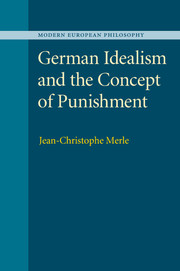Conclusion
Published online by Cambridge University Press: 04 August 2010
Summary
In Part i, we examined the Kantian, retributivist thesis, according to which the criminal is punished, because he or she merits it. Two interpretations of the Kantian concept of right are possible (see Chapter 1). On the one hand, according to the liberal interpretation, which does not refer to the internal disposition of human beings, right is defined merely as being the coexistence of the freedom of action of all human beings according to the principle of equality of right. On the other hand, according to the moral interpretation, which substantially refers to the internal dispositions of human beings, right should implement the content of the categorical imperative as far as possible through the application of coercion. In accordance with both of these interpretations, two dimensions can be distinguished in the Kantian retributivist thesis: one genuine dimension of legal ethics, which is a dimension independent of the internal dispositions of individuals (see Chapter 2), and a dimension of personal ethics (see Chapter 3). The dimension of legal ethics of the Kantian retributivist thesis contradicts the requirement for the coexistence of all freedoms, of which the freedom of the criminal is a part too, and of which it ought again to become a part – at least in the most direct way. The dimension of personal ethics contradicts the postulate of the highest good, which rather requires forgiveness toward the criminal as long as this forgiveness is compatible with the concern for the safety of the other citizens.
- Type
- Chapter
- Information
- German Idealism and the Concept of Punishment , pp. 187 - 196Publisher: Cambridge University PressPrint publication year: 2009



